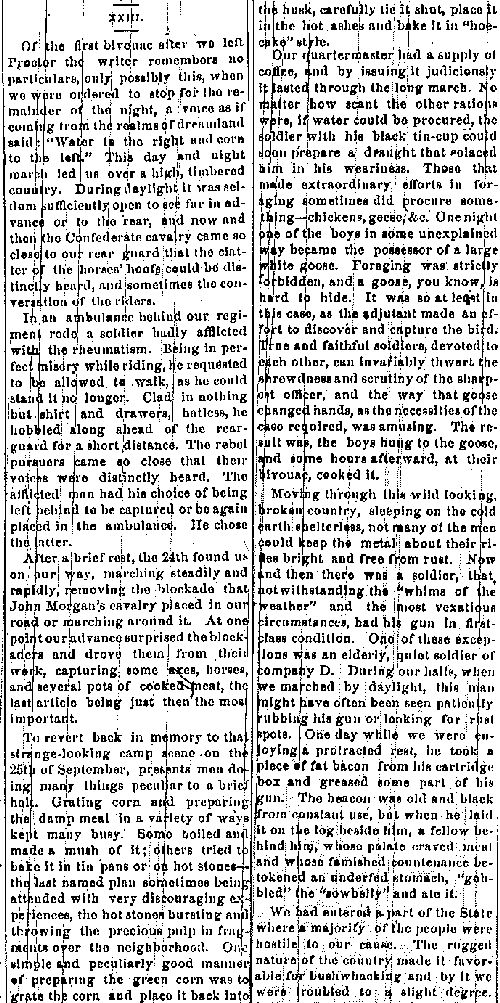| Camp & Field Page 38C | Camp & Field Index Page | 16th OVI Home Page | Camp & Field Page 38E |
The Camp & FieldArticles by Theodore Wolbach |
 Cpl. Theodore D. Wolbach |
The following image is taken from a book titled "Mortality and Statistics of the Census of 1850" in which it is believed retired Captain Rezin H. Vorhes, Company H, pasted over the pages a series of articles written by Cpl. Theodore D. Wolbach, Company E, titled "Camp and Field" and published, by chapter, in the Holmes County (Ohio) Republican newspaper from February 24, 1881 to August 17, 1882. The articles tell the story, in great detail and color, of the 16th OVI, from the inception of the 3-year regiment in October, 1861, through all its camps, battles and marches until it was disbanded on October 31, 1864. The articles pasted in the Vorhes book cover the first 35 chapters, published through October 20, 1881. All the remaining chapters were recently found in a Holmes County library by researcher Rob Garber who obtained copies, performed the transcriptions and provided to this website and which are also presented here, thus providing the complete work by Theodore Wolbach.
Throughout these articles click on the underlined white text for additional details.
The webauthor thanks 16th Ohio descendant Rob Garber for his excellent research on the Camp And Field articles and for performing the tedious digital transcription of those articles found on each page. The transcriptions were made to reflect the original articles verbatim, misspellings and all. Rob is the 3rd great nephew of Capt. William Buchanan, Company F, 16th Ohio, who served in the 90-day regiment as a private, re-enlisting in the three year regiment, and eventually making the rank of Captain of Company F. Thanks Rob!
Page 38D - Chapter 23 - September, 1862
 |
Published in Holmes County Republican XXIII. Our first bivouac after we left Proctor the writer remembers no particulars, only possibly this, when we were ordered to stop for remainder of the night, a voice as if coming from the realms of dreamland, said, In an ambulance behind our regiment rode a soldier badly afflicted with the rheumatism. Being in perfect misery while riding, he requested to be allowed to walk, as he could stand it no longer. Clad in nothing but shirt and drawers, hatless, he hobbled along ahead of the rear guard for a short distance. The rebel pursuers came so close, that their voices were distinctly heard. The afflicted man had his choice of being left behind to be captured or be again placed in the ambulance. He chose the latter. After a brief rest. The 24th found us on our way, marching steadily and rapidly, removing the blockade that John Morgan's cavalry placed in our road or marching around it. At one point our advance surprised the blockaders and drove them from their work, capturing some axes, horses and several pots of cooked meat, the last article being just then the most important. To revert back in memory to that strange-looking camp scene on the 25th of September, presents men doing many things peculiar to a brief halt. Grating corn and preparing the damp meal in a variety of ways kept many busy. Some boiled and made a mush of it; others tried to bake it in tin pans or on hot stones -- the last named plan sometimes being attended with very discouraging experiences, the hot stones burating [sic] and throwing the precious pulp in fragments over the neighborhood. One simple and peculiarly good manner of preparing the green corn was to grate the corn and place it back into |
the husk, carefully lit it shut, place it in the hot ashes and bake it in Our quartermaster had a supply of coffee, and by issuing it judiciously it lasted through the long march. No matter how scant the other rations were, if water could be procured, the soldier with his black tin-cup could soon prepare a draught that solaced him in his weariness. Those that made extraordinary efforts in foraging sometimes did procure something--chickens, geese, &c. One night one of the boys in some unexplained way became the possessor of a large white goose. Foraging was strictly forbidden, and a goose, you know, is hard to hide. It was so at least in this case, as the adjutant made an effort to discover and capture the bird. True and faithful soldiers, devoted to each other, can invariably thwart the shrewdness and scrutiny of the sharpest officer, and the way that goose changed hands, as the necessities of the case required, was amusing. The result as, the boys hung to the goose, and some hours afterward, at their bivouac, cooked it. Moving through this wild looking, broken country, sleeping on the cold earth shelterless, not man of the men could keep the metal about their rifles bright and free from rust. Now and then there was a soldier, that, not withstanding the We had entered a part of the State where a majority of the people were hostile to our cause. The rugged nature of the country made it favorable for bushwhacking and by it we were troubled to a slight degree. |
| Camp & Field Page 38C | Camp & Field Index Page | 16th OVI Home Page | Camp & Field Page 38E |